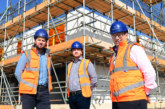
Ian Atkinson, partner at law firm Womble Bond Dickinson, asks whether it’s time to incentivise Modern Methods of Construction (MMC).
It sometimes seems that Modern Methods of Construction are held up as being the answer to every major issue that the construction industry faces in the short and long term.
MMC improves quality, using processes and materials that provide consistency from start to finish. Errors, should they occur, are eradicated quickly and then not repeated. MMC also makes for safer sites, where buildings are erected more quickly and more sustainability. Home designs can also be flexible and adaptable to individual needs.
Despite what looks like a compelling case, MMC is struggling to achieve the scale and volume needed to really have an effect. According to the RICS, only 8% of homes built in the UK rely on MMC. While that figure could rise to 20% over the next 10 years, it still indicates that MMC is struggling to gain a foothold among housebuilders. So, what are the limiting factors preventing widespread adoption of MMC?
Cost – The main factor is cost, of course. It’s boom time for housebuilders right now, but margins can be incredibly tight – the effects of the pandemic and Brexit are taking their toll, as we see a continued rise in the cost of building materials and a shortage of labour.
Also there is a Catch-22 situation: until MMC is adopted more widely, the costs involved are unlikely to come down. But until the costs come down, it’s very difficult for it to be adopted more widely.
Mortgages – It has, for some time, been difficult to find a high street lender prepared to offer a mortgage on a home built using MMC/off-site construction methods. While perceptions of MMC homes are improving, many lenders still have concerns over long-term build quality.
There is hope that this will become easier: a number of leading industry bodies, including the NHBC, have signed a Memorandum of Understanding after the Government agreed to create a minimum standard for MMC-built homes in the UK.
Logistics – The scope for MMC is strictly limited by the size of parts that can be moved across the country. There’s no point assembling a building off-site if you then can’t move it to its intended location easily. The width of UK carriageways – either on motorways or on local roads is severely limiting.
Skills – Although the time required to train people to design and operate MMC manufacturing and assembly processes is considerably less than the time taken to train for traditional skills, there is, due to the relative newness of the industry, a shortage of sufficiently skilled people. As we are short on traditional construction skills at the moment, developing MMC skills may not feel like the top priority for many housebuilders.
Certainly, any skills drive, led by Government or the industry, should consider the development of factory-based MMC skills as a vital part of the training mix to aid long term goals.
A consultation launched by the Government in February 2021 (now closed) on the future of the New Homes Bonus has raised the possibility of MMC-built homes being incentivised as part of the Bonus scheme.
We would strongly encourage such incentivisation. Government policy and social housing will help to bring about the wider adoption of MMC in the public sector, and with time this will pave the way for the private sector to follow.
However, with the Government’s own 2025 deadline for all new-build homes to be ‘zero carbon ready’, the clock is ticking and we feel incentivising MMC for the private sector will help to tackle to issue from both ends.








